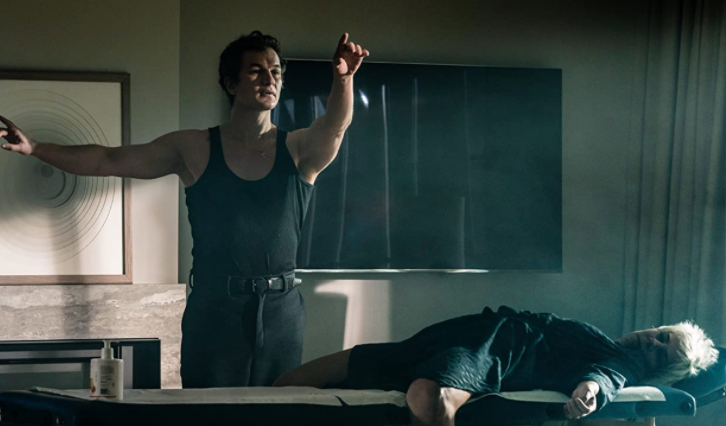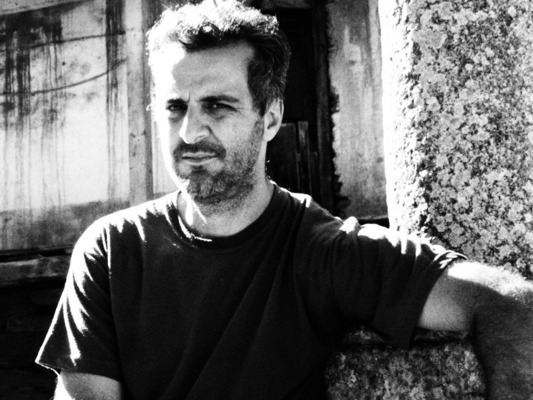
Magdalena Szumowska, the Polish born filmmaker who’s been making movies since the late 1990s, and Emma Seligman, the American director whose debut feature was slated for SXSW and played at TIFF, have both delivered two of probably most jarringly memorable movies by women in 2020. To this slate, we should no doubt add Miranda July’s Kajillionaire, which premiered at Sundance. Both Szumowska and Seligman have a cutting, often sardonic humor, with their female characters flaunting socially acceptable behavior. And Szumowska and July, in particular, have also expanded their worldview, to now look beyond the claustrophobically agonizing private worlds to what feels like a much broader social critique of what we may wistfully call “the world we live in now,” or the “state of things.” In both cases, it matters intensely that that world is Eastern European, albeit profoundly westernized, in Never Gonna Snow Again, and Californian, albeit savagely globalized, in Kajillionaire.
In Szumowska’s film, co-directed with Michał Englert, a mysterious, reticent Ukrainian healer, Żenia, arrives in Poland. He says he comes from Pripyat, the village right outside Chernobyl, and asked which languages he speaks he replies, “All.” He later delivers on this promise, exchanging small talk with an Asian neighbor, though he can never quite communicate fluently with the Poles — perhaps doesn’t need or want to. The boastful young Żenia soon makes his way into a prosperous Warsaw neighborhood, with identical white villas and pristinely manicured lawns. The homes he comes into vary, from clean cool contemporary, cluttered with children’s toys and gadgets, to ’50s modern sparingly accentuated with spiritualist touches, then to one with kitschy plush decor and pillows stamped with prints celebrating dogs. What these homes have in common is that in most it’s primarily upper-class or rich bored women who receive Żenia. Here the interactions waver between the women’s needy projection of their ennui, prejudices and desires, and the more mysterious healing moments, when Żenia appears to be in fact in such high command of their bodies he can project them into dream states.
Szumowska has assembled such a stellar cast, it’s breathtaking. Viewers may remember Maja Ostaszewska as the quietly grieving Anna in Szumowska’s Body (2015). In Never Gonna Snow Again, Ostaszewska is the opposite: chatty, to the point of unthinking, an over-achiever, who puts her children through French school and endures torturous recital lessons for their sake, but who feels she’s never doing enough. Then there’s the magnificent Agata Kulesza, who became the face of the cinema of Pawel Pawlikowski in recent years, playing the Stalinist aunt plagued by guilt in Ida (2013), and the reporter chasing after Polish folkloric songs in Cold War (2018). With smartly cropped white hair and dark sunglasses Kulesza plays the free-spirited intellectual type. Then finally, there’s Katarzyna Figura: Vaunted by the national press as a Monroe-like bombshell in the 1980s, and known for films such as Piotr Szulkin’s Ga-ga, Glory to the Heroes (1986), Juliusz Machulski’s King Size (1988), Figura disappeared for over a decade, making small cameos in foreign films such as Robert Altman’s Ready to Wear (1994) and Roman Polanski’s The Pianist (2002). But Figura is back in top form in Never Gonnna Snow Again, as a seductive dog-obsessed eccentric. If her role feels fleeting, it’s because Szumowska isn’t so much after personal dramas but instead a composite portrait. The quiet and withdrawn healer is a blank slate, a carte blanche. What emerges in his interactions with this upscale gated community is the extent to which our age has “normalized” healing and spiritualism — from tai-chi inspired workouts, to obsession with healing herbs, and endless natural organic products — while giving up none of its consumer tech driven capitalist act. In one striking sequence, Szumowska and Englert elide the infamously drab bloki, with their monotony of identical apartment buildings and staircases, with the equally standardized contemporary suburbs, regardless of the latter’s urbanite suaveness, with private security guards in yellow-striped vests zipping by on scooters.
Magic, however, cannot be tamed, and to prove this point, Szumowska and Englert reach far, into the catalogue of Andrei Tarkovsky’s Stalker (1979). In a subtle sequence, when Żena looks out at a landscape painting, the camera zooms in, to enter it — and Żenia sees his mother amidst fall leaves. It’s a gorgeous leap into the zona, as a physical space of Żena’s origin story, and so the germination of his ability to heal by touch, and also as a psychic space, in which Żena and his mother can still communicate. Their meeting will become more literal later in the film, and I’d argue, needlessly so. There’s also the moment when Żena zooms back to his childhood memories, and a scene of him sitting at a family table, moving a glass just by looking at it, is borrowed directly from Stalker. But the film doesn’t need this literalness, as striking as it is — Englert’s contrasting cinematography, between the crispness of his contemporary scenes to the lushness of nocturnal forest landscapes, when the healed enter a trance under Żenia’s tutelage, have already done enough imaginative work to transport us fluidly between insipid, hygenic suburbs and the emptiness lurking beneath all that varnish.
Emma Seligman’s Shiva Baby, is also a fantastic and bold social satire. The quick-to-scowl Maya, played with enviable comedic verve by Molly Gordon, is on her way to a gathering of mourners for a relative she doesn’t recall that well, and where she’ll get a brusque, confounding jolt: The middle-aged client whom she just met while doing sex work for extra cash (for which she appears to have no urgent need), turns out to be a good friend of Maya’s family, and pops into the party wit his wife and a small baby. Meanwhile Maya, who’s always at odds with her parents, who’d have her get into a promising profession, rather than bungle through women’s gender studies, is being warned numerous times not to get cozy in front of the whole family with the ambitious, law-degree-aspiring Danielle (Rachel Sennott). Thus the party gets underway, with Maya uncomfortably pegged between double-entendres with Danielle and with the professorial client slowly figuring out that Maya had fooled him, delivering a sob story about how she was putting herself through law school finding multiple sugar daddies. The tension escalates to a riveting pace, where liquids are spilled, dark glances crossed, and bathroom sex is imminent.
Szumowska and Englert’s feminist slant is felt more keenly in delivering spirited urban women trapped into contemporary norms of ideal body types, rigorous yoga flows and water intake, which deliver little actual parity, or personal fulfillment. All this appears in the margins in Never Gonna Snow Again, which moves briskly from urban sprawl, to ecology and environmental concerns, to feminism and vegetarianism. Meanwhile’s Seligman’s feminist bend is front and center, if anything because so much of the chatter directed at Maya is by other Jewish women concerned with her ability to form a family, and become a model mother, with some professional perks. It takes a a willful mind, a scissor-sharp tongue and steel Panzer shield fortified with bad-girl attitude to break out of this homogenizing mold, which treats womanhood mostly in favor of and subservient to motherhood.
Seligman who wrote the screenplay is all hot-flash dialogue, and in this way, she has an enormous talent that recalls Woody Allen’s highly talkative long takes, while the energy of exploration, of bending social mores, also reminded me of Bette Gordon’s Variety (1983). Shiva Baby is a sublime, mean, witty, cutting party film, and a lesbian love story that takes you by surprise and suddenly makes all the performative nastiness (though not the fun of it) fall away. When that moment comes, it’s like being cleansed, exhausted, from all this party-going. When the swirl and roar dies down, I was thinking of John Cassavetes’ Faces (1968) — a quiet, sobering weariness that is also immensely satisfying.
For more coverage on TIFF, see Festival Diary Day 1, covering shorts and Miwa Nishikawa’s Under the Open Sky.

